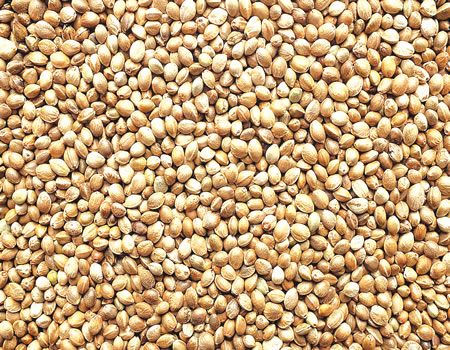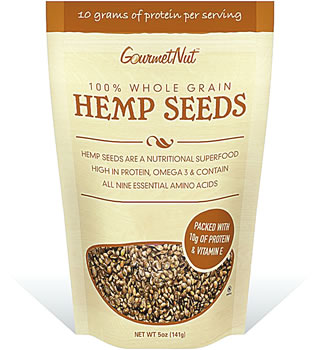EXACTLY a year back, Saturday Tribune published a report on the importation of hemp seed from Canada to Nigeria and the sale in major supermarkets in Lagos. But till date, government agencies, particularly the National Drug Law Enforcement Agency (NDLEA) and the National Food and Drug Administration and Control (NAFDAC) appear still at sea on how to contain it as it still floods Lagos.
One year after, the product known as Gourment Nut Hemp, confirmed to Saturday Tribune then by the NDLEA through its former spokesperson, Mitchell Ofoyeju, as testing positive for marijuana following a forensic laboratory test, and which Jimoh Abubakar of NAFDAC tagged illegal, is not only still selling like a hot cake in the state, its availability is becoming commonplace as many supermarkets, big and small, now conspicuously display the product.
The boom in its sale, despite being relatively expensive, according to findings, is reportedly due to higher patronage as more Lagosians, particularly the elite, get hooked on the hemp seeds’ advertised nutritional values.
Open sore
With no obvious official efforts to curb the spread of the illegal product, Saturday Tribune decided to reopen its investigation as the national opioid crisis festers. Apart from the package being available at any store worth its salt, it was discovered that a price reduction has also been effected. Instead of between N3,500 and N3,000 of last year, the standardised price now is N2,400, as of May 8, 2018 when Saturday Tribune posed as a buyer at a Surulere supermarket.
All efforts by Saturday Tribune to get reactions from NDLEA and NAFDAC officials on what was being done to nip the growing trend in the bud proved abortive.
Apart from numerous phone calls put across to the agencies through their image makers to let them know how the dangerous product was still being smuggled into the country and bought in large quantities, questions were also forwarded to them which were not responded to.
When NDLEA first laid its hands on the product last year, it was through Saturday Tribune which made available to the agency, a pack bought at N3,000 with the receipt.
The agency, through Ofoyeju, had pleaded with this medium to delay the report then for it to conclude its investigation. Incidentally, the agency returned with the “positive for marijuana” verdict the same day the report was published. The receipt showing details of the purchase was availed the agency on request to further demonstrate this medium’s commitment to helping the agency in its promised probe of how the banned substance found its way into the country. Expectedly the product is also without a NAFDAC number.
Goose chase
Curiously, last year, when Saturday Tribune got back to the agency for the outcome of the promised raid and crackdown, Ofoyeju said the officers couldn’t find the product again in the said store or anywhere else in the state.
Ironically, Saturday Tribune bought a pack from the same store the next day. The agency was alerted again. It could not be established if someone somewhere was tipping off the stores about the planned raids. That was the last Saturday Tribune heard about NDLEA’s efforts at curbing the spread of the imported marijuana.
The same drama by NDLEA also played out with NAFDAC. When Saturday Tribune tried to get the agency involved by bringing the discovery to the attention of its image maker, Jimoh Abubakar, it was the same promise of “we will investigate” despite confirming that the seeds remained illegal. Both NDLEA and NAFDAC admitted to the product being news to them when told by Saturday Tribune with Jimoh asking again, “you mean hemp seeds?” He was very emphatic that regardless of the so-called health purposes the seeds purportedly serve, the product remained illegal as long as it wasn’t with the agency’s number.
With all the requisite details made available to him, he gave the assurance that the Lagos end of the agency would be swinging into action immediately.
That was also the last that was heard from the agency.
About one week after the questions were sent, Saturday Tribune followed up with phone calls and messages to inform the agencies that they needed to respond to the questions for a balanced report.
His response: “I have been away. I will get back to you.”
Another reminder was sent to him on May 5, 2018, sixteen days after the questions were forwarded to him.
His response: “Agreed that you drew the attention of the agency to the sale of the food item. At the time of surveillance, the product was off the shelve. We therefore need to revisit the place with new piece of information. I would like to link you up with agency’s formation in Lagos for prompt action.”
The link he supplied who contacted Saturday Tribune, however, requested the reporter to come to the NDLEA’s office in Lagos to get all the information at her disposal.
For NAFDAC, a reminder dated April 26, 2018, which was sent to its spokesperson, stated: “Good evening. We will appreciate if we can have answers to the questions sent to you last week by tomorrow, Friday, as we intend to publish our report by next week Tuesday.”
Speaking with the reporter on phone same day, the image maker promised that as soon as he got answers to the questions from the appropriate officer in Lagos office, he would furnish this reporter with the answers.
Efforts to get the agencies to respond to the questions failed, even as drug abuse, the latest being that of codeine syrup, continues to spread like wildfire.
From Canada with ‘love’
Though the hemp seeds are being bagged by Gourment Nut with address given as 3611 14th Ave. Brooklyn NY 11218, United States of America, the company pointed out on the pack that the hemp seeds, which are the main ingredients, are a product of Canada. Saturday Tribune’s checks showed that while hemp or marijuana in whatever form isn’t yet legal in Canada, the country’s leader, Prime Minister Justin Trudeau, in April 2017, sent a bill to the parliament seeking to make the consumption of marijuana legal in the country. Marijuana is, however, legal in some American states like Colorado, Washington, Oregon, Alaska, California, Maine, Massachusetts and Nevada.
Gourment also explained that the hemp seed packs were “manufactured in a facility that processes peanuts/nuts”. The pack got by Saturday Tribune from a supermarket located at Ogudu GRA, Lagos, on 29 May, 2017 at exactly 4.02.53 p.m. reads, “Best BY 3/17/18” suggesting 17th March 2018, with batch no 6 0972284434 5.
In the item column, the receipt reads “GOURMT NUT HEM” with the “P” in “Hemp” omitted and “Seeds” not reflecting at all.
Great protein or toxic?
In marketing the package’s benefits, the company says “hemp seeds contain all nine essential amino acids and are a rich source of Omega-3 and Omega-6 essential fatty acids, which may help lower blood pressure and reduce the risk of heart disease. They are also a great source of protein contain high amounts of trace minerals, including magnesium, iron and potassium as well as Vitamin E and antioxidants”.
Potential users were then invited to “try sprinkling hemp seeds over a salad as a topping on granola or mixed in a smoothie”.
The promo on the pack must have got a lot of people hooked on it, particularly the aspect on topping salad with the seeds. A user told Saturday Tribune that such “topped salad” is always “stimulating”.
The benefits of the seeds are also listed to include “10 grams of protein per serving. Gourmet Nut 100 whole grain. Hemp seeds are nutritional superfood High in protein, Omega 3 and contain all nine essential amino acids. Packed with 10g of protein and Vitamin E. Net WT 340g.” The nutritional facts; serving size 1oz (28g) serving per container 12, Calories 163, fat Cal 118.
There is also a long list of vitamin benefits like total fat 13g or 19 per cent, sat fat 1g or five per cent, Trans fat 0g, Cholesterol 0mg. Sodium 0mg, Total Carb 2g or one per cent, Dietary Fiber 1g or 4 per cent, Sugars 0g, Protein 10g, Vitamin A, C 0 per cent, Calcium 0 per cent, iron 15 per cent. Percent daily values are based on a 2,000 calorie diet.
Saturday Tribune got across to Gourmet Nut, the maker of the product, through its website, www.GourmentNut.com, which is the only contact point provided on the hemp seed package, to ask why the product didn’t go through NAFDAC validation process. No response was got.
Prolonged use damages the brain –Experts
According to scientific research, while it has been argued that many of the users of these seeds engage in the act for neutrino, the prohibition of such drugs is premised on the vast number of negative consequences that are thought to arise from their usage, especially the psychoactive substances. These consequences lay emphasis on the pharmacological effects of the drugs themselves, including the possibility of addiction, adverse psychological conditions, including death and other health hazards associated with the consumption of substances (Amuda 2004).
Corroborating this fact, Dr Olayinka Atilola, a consultant at the Neurology Department of the Lagos State University Teaching Hospital (LASUTH), declared that all cannabis plants, including the leave, the root, the stem and the seeds, contain active ingredients which can activate the brain of the user negatively sometimes. According to Atilola, prolonged use of the seeds by any young person can lead to brain damage or mental disorder.
The consultant, who alerted on the danger the use of the seeds poses to the youth, insisted that in any way Indian hemp is consumed, the user is prone to negative reactions. He however, blamed the high rate of the hemp seeds and other dangerous drugs on the free access of getting them readily available, adding that “Nigeria’s control system of drug is still lagging behind.”
Not all Tokunbo are good
Another consultant at the Psychiatry Department of LUTH, Dr Dapo Adegbaju, attributed the influx of hemp seeds into the Nigerian markets to the craze for foreign-made products.
He took a swipe at the average Nigerian and particularly the elite who likes to copy foreign culture without thinking of the negative impact.
“All these people who want something nutritious take all these seeds which are not common to our nature. The seeds contain active ingredients and those selling them deceive the users by telling them that the active ingredients in the seeds are very small, which is the gimmick they use in attracting the users. It is not everything that is done outside this country that is good. We should stop copying them. They should stop buying these seeds all in the name of looking for nutrients. We have many local foods in Nigeria with high nutrients,” he submitted.
‘NDLEA, NAFDAC should build detention centres’
According to the two neurologists, the relevant government agencies should embark on serious public enlightenment on the negative implications of consuming these seeds. To them, apart from shutting down the supermarkets where these dangerous seeds are sold, the agencies should establish centres where those who are abusing the drugs can be counselled and rehabilitated, adding that the searchlight should be on the sellers, not users.
Functions of NAFDAC
NAFDAC was created to act as specific check and control over possible counterfeit goods, in accordance with Nigerian laws and regulations. Other functions of NAFDAC include to control the export and import of various medications, chemicals, cosmetics etc, including their sale and usage, testing of the aforementioned products and checking their compliance with Nigerian standards of quality. Investigation and control of the raw materials used for the production of medications and cosmetics, working out regulations and guidelines for the production, sales and moving of these goods within and beyond the borders of the country and many more.
Functions of NDLEA
NDLEA was established on January 1, 1990 by Decree number 48 now known as the Act of Parliament.
Among the major functions of the NDLEA is to take measures to stop the movement of drugs within and around the borders of the country.
Besides, the anti-narcotic agency is responsible for coordinating the arrest, investigation and prosecution of all offenses related to the trafficking of drugs. There are other drug units outside the NDLEA with similar responsibilities. These peripheral institutions work hand in hand with the NDLEA and are responsible to the agency in the performance of their duties.
Drug-related laws in Nigeria
There are various laws that regulate and control the manufacture, sale, and distribution of drugs in Nigeria. They include:
(i) Poisons and Pharmacy Act, Cap 366 of 1990. This Act regulates the compounding, sale, distribution, supply and dispensing of drugs and provides different levels of control for different categories of drugs and poisons.
(ii) Food and Drugs Act Cap 150 of 1990. This Act prohibits the sale of certain foods, drugs cosmetics and devices as treatment for certain diseases. The Act prohibits the importation, exportation, distribution and sale of specified drugs. It also prohibits practices such as misleading packaging, labelling, and advertising, as well as manufacturing food and drugs in unsanitary conditions. It conveys the power to appoint inspecting officers and food and drug analysts.
(iii) Counterfeit and Fake Drugs (miscellaneous provisions) Act, Cap 73 of 1990. This Act prohibits the production, importation, manufacture, sale and distribution of any counterfeit, adulterated banned or fake drugs. It also prohibits persons to sell any drug in an open market without permission from the proper authority.
(iv) Pharmacists Council of Nigeria, Decree 91 of 1992. It repealed the Pharmacists Act of 1964. This decree established the Pharmacists Council of Nigeria which is charged with the following responsibilities: (a) Determine the standard of knowledge and skill required of persons seeking to become a pharmacist.
Why FG should act fast
Many of those spoken to generally agreed that Nigeria has a sensitive problem at hand which requires urgent action.
“The Federal Government should cooperate with the Lagos State government to support the NDLEA, NAFDAC, Standard Organisation of Nigeria (SON) and other relevant agencies to identify and block all the leakages through where the dangerous drugs and illegal weeds are being brought into the country,” said a medical doctor at a private hospital in Ikeja who did not want to be quoted.
We abuse drug here –Transporter
A transporter operating between Egbeda and Oshodi, Mr Mojeed Adewumi, confirmed the involvement of many transporters in drug abuse, saying that the best way to handle the menace was for the government to look into the activities of the relevant agencies whose jobs it is to monitor the influx and sale of illegal and dangerous seeds. “If need be, the agencies should be more funded to enable them equip their officials to adequately fight the menace,” he said.








